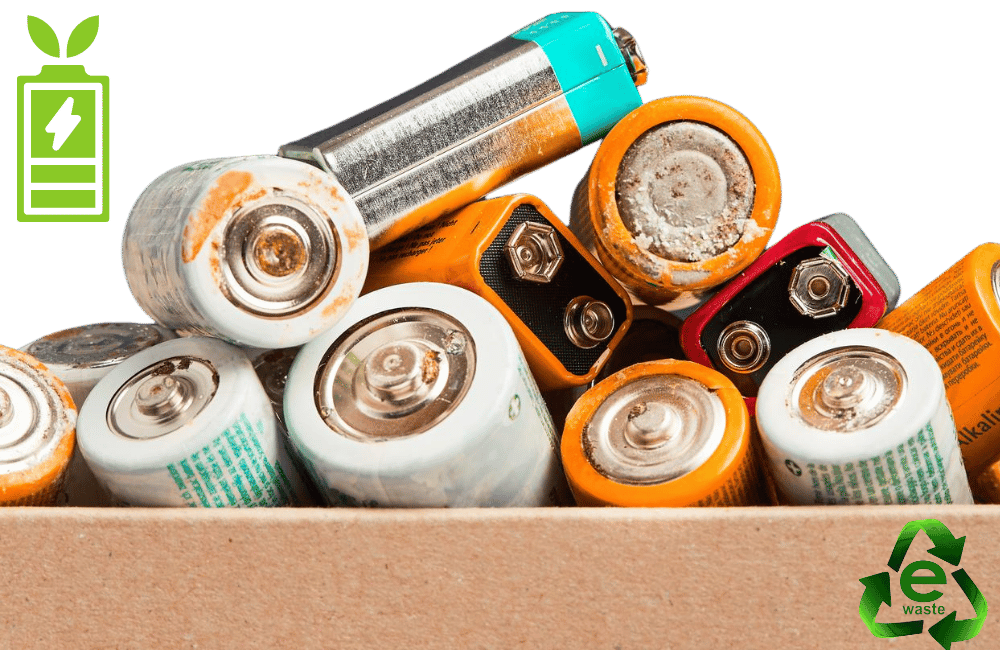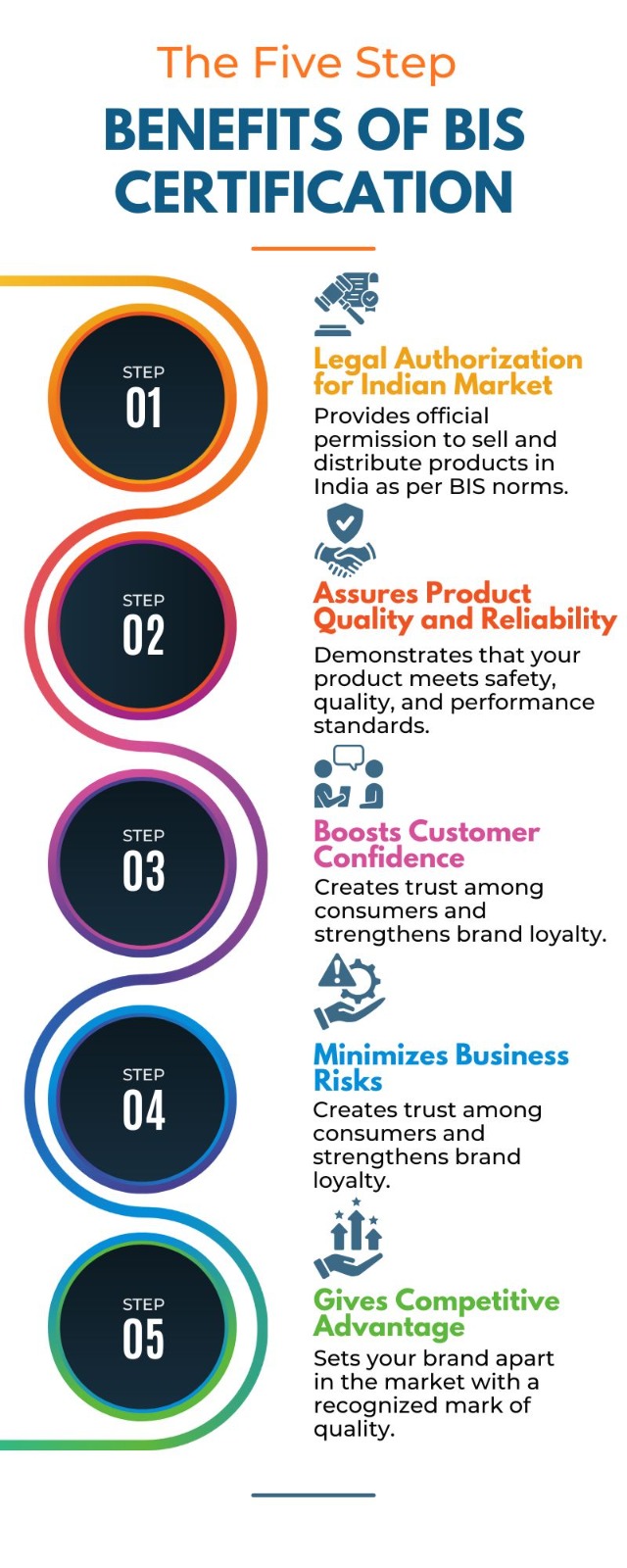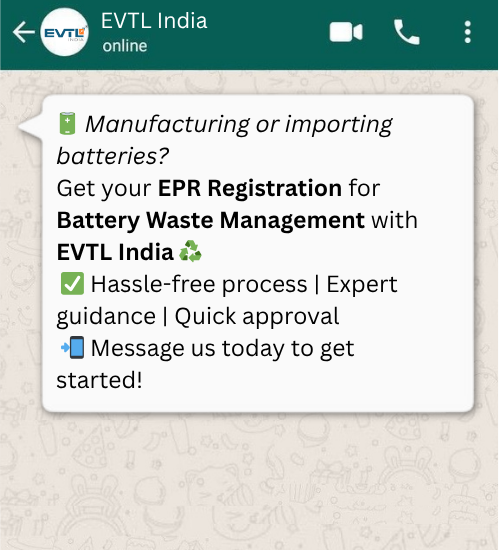Get A Quote
EPR Registration for Battery Waste Management
Looking for EPR Registration for Battery Waste Management? EVTL India offers a comprehensive solution for all your regulatory compliance needs, including EPR for battery waste. Our expert consultants are available 24/7 to guide you through the process and ensure a hassle-free experience in meeting your regulatory requirements.

Introduction to Battery Waste Management (BWM) Rules, 2022
The Battery Waste Management (BWM) Rules, 2022, introduced by the Ministry of Environment, Forest, and Climate Change on August 22, 2022, mark a significant update in the regulation of battery waste in India. These rules emphasize Extended Producer Responsibility (EPR), requiring battery producers—including manufacturers and importers—to oversee the entire lifecycle of their products, thereby addressing environmental and health impacts associated with battery waste.

This includes ensuring that batteries are properly collected, recycled, or refurbished, regardless of their type, size, or chemistry. The primary objective is to mitigate environmental and health impacts associated with battery waste, promoting a more sustainable approach to battery disposal and recycling.
Under the BWM Rules, 2022, producers are required to register with the Central Pollution Control Board (CPCB) via a centralized online portal by submitting an application in Form 1(A). This registration must be renewed before the expiration of the current registration, also using Form 1(A). The EPR framework mandates that producers take full responsibility for managing used batteries in an environmentally sound manner, thus safeguarding human health and the environment from potential hazards posed by battery waste.
In addition to producers, refurbishers and recyclers must also register with the State Pollution Control Boards through the same centralized portal. This registration is a one-time requirement, but these entities must submit quarterly returns in Form 4. These returns provide detailed information on the quantity of used batteries collected, refurbished, and recycled, as well as any hazardous waste generated during the process. This comprehensive approach ensures greater accountability and efficiency in the management of battery waste.
Key Provisions of BWM Rules 2022:
Benefits of EPR Registration for Batteries
Improved Waste Management
EPR registration fosters a more efficient waste management system by requiring manufacturers to set up processes for collecting and recycling used products. This leads to better waste sorting, higher recycling rates, and a significant reduction in environmental waste.
Cost Efficiency
EPR implementation can help businesses cut costs by streamlining waste management. Companies can reduce disposal expenses, generate revenue through recycling efforts, and improve overall operational efficiency.
Enhanced Corporate Reputation
Enhanced Corporate Reputation: EPR registration strengthens a company’s image, particularly among environmentally conscious consumers. This helps build trust, boost brand loyalty, and increase competitiveness in the market.
EPR Registration Process for Battery Waste Management

01
Assessment and Documentation:
Applicants must submit complete details and documentation for their Extended Producer Responsibility (EPR) certification for battery waste. Our expert team will review and verify all information to ensure accuracy and address any discrepancies.

02
Filing the EPR Registration Form:
After verification, our team will submit the EPR registration application to the Central Pollution Control Board (CPCB) for online processing.

03
CPCB Application Review:
The CPCB will assess the application. If any issues or inconsistencies are identified, they will be addressed before proceeding further.

04
Issuance of EPR Authorization:
The EPR authorization certificate will be issued within 30 days of submitting the application. After receiving the certificate, producers must implement an EPR action plan to meet their annual targets.
Documents Required for EPR Battery Waste:
Fee for Battery EPR Registration
The cost for registering under EPR for battery waste management set by the government can change depending on how much waste you produce:
| Annual Turnover in Cr. | EPR Registration Fee |
|---|---|
| Less than 5 Cr. | Rs 10,000 |
| Between 5-50 Cr. | Rs 20,000 |
| More than 50 Cr. | Rs 40,000 |
- Fees for renewal of Registration shall be the same as the Registration fee.
- The fees shall be paid online through the payment gateway integrated in the portal
- Application Fees is exclusive of any transaction charges.
Renewal of Registration Guidelines
Cancellation of Registration Guidelines
- False Documentation: The registration of a Producer/Manufacturer may be canceled or suspended at any time if any submitted documents are found to be false.
- Non-Compliance with EPR Obligations: The Central Pollution Control Board (CPCB) may suspend or cancel the registration and/or impose Environmental Compensation if the Producer/Manufacturer fails to comply with Extended Producer Responsibility (EPR) obligations as per Schedule II.
- Violation of Battery Waste Management Rules, 2022: The CPCB may suspend or cancel the registration and/or impose Environmental Compensation if the registered entity violates the Battery Waste Management Rules, 2022.
- Right to a Hearing: Producers/Manufacturers will be given an opportunity to present their case within 15 days of receiving the notice before the CPCB considers cancellation or suspension.
- Appellate Authority: The Joint Secretary, or an equivalent officer in the Ministry of Environment, Forest, and Climate Change, will act as the Appellate Authority for these cases.
Conclusion
The Battery Waste Management Rules, 2022, represent a significant step towards improved environmental stewardship by mandating comprehensive EPR for battery waste. The centralized registration and monitoring system provides transparency and ensures strict compliance with the environmental goals of the BWM Rules, 2022. By implementing these rules, producers can enhance waste management practices, achieve cost savings, and bolster their corporate reputation. For a seamless EPR registration process, EVTL India stands out as a leading consultant specializing in battery waste management. Contact us to handle your EPR registration hassle-free and ensure full compliance with regulatory requirements.
Frequently Asked Questions (FAQ)
Our Services
News & Updates









